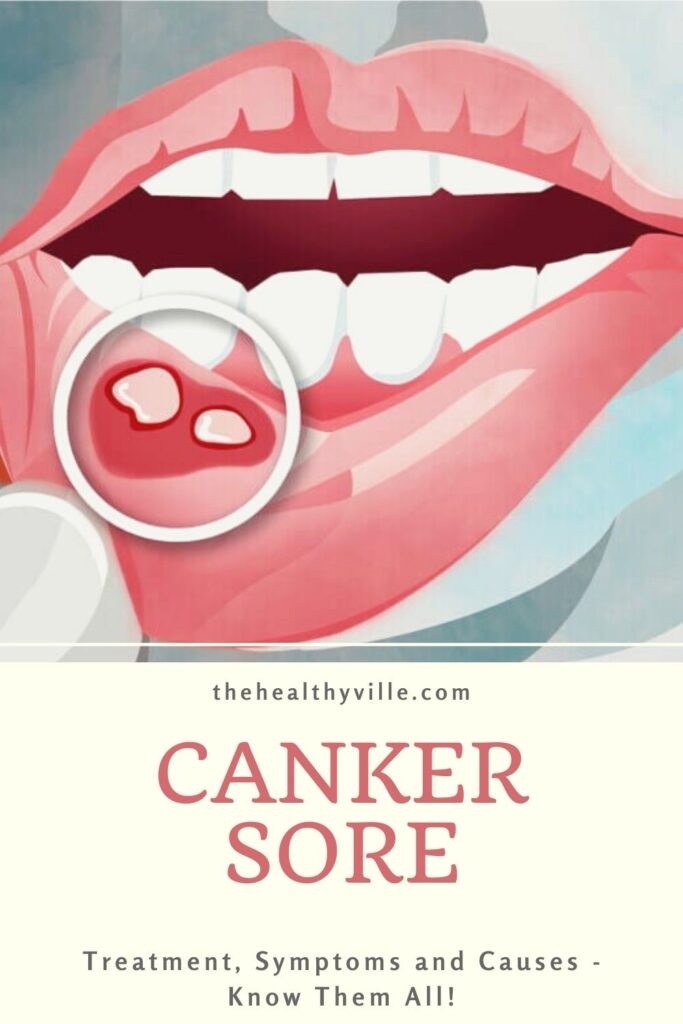Canker sore treatment options may vary, but the causes and symptoms are unmistakable. Find out everything you need to know about them!
These small lesions on the oral mucosa can be really annoying. They are not usually serious, however, on some occasions they can be a symptom of more serious diseases.
Canker sores are small open sores or ulcers that start on the lining of the mouth. In fact, these small lesions are usually white or yellowish in color and are surrounded by a bright red area.
They can appear anywhere in the mouth but often form on the inside of the cheeks, the inside of the lips, and the base of the gums.
They are not a serious health problem. Although there are people who confuse them with cold sores, they are benign lesions, not contagious, that disappear easily.
What causes canker sores?
Tobacco is capable of increasing the effects of the lack of the enzyme that digests ethanol.
As the scientific literature indicates, the causes of canker sores are not fully established. In fact, its appearance is related to imbalances of the immune system, mechanical aggressions and hereditary factors. Some of its best known triggers are the following:
- Smoking.
- Emotional stress.
- Aggressive dental cleaning.
- Hormonal imbalances.
- Viral infections or immunosuppression.
- Allergies or intolerances to certain foods.
- Oral injuries due to dental work.
- Local trauma, such as accidental bites.
- Contact with aggressive chemicals or very hot substances.
- Deficiency of certain vitamins and minerals in the diet, especially iron and vitamins B9 and B12.
Symptoms of canker sores
Most of the time, a canker sore forms on the lining of the inside of the cheeks and lips. However, they can also appear on the tongue, roof of the mouth, or the base of the gums. Among the symptoms of canker sores we find:
- General discomfort.
- Moderate fever
- Pain in the area of the sore.
- Swollen lymph nodes.
- One or more small white wounds with red edges.
The discomfort begins to diminish in a period of 7 to 10 days, taking up to 3 weeks for the ulcer to heal completely.
Diagnosis
A canker sore does not involve complications and goes away on its own in a short time. Most of the time it is not necessary to go to the doctor. In the event that we have to go, the professional will begin by directly observing the injury.
In fact, if they appear on a recurring basis, the doctor may find the need for more exhaustive analysis to rule out possible underlying diseases, some of which may be:
- Erythema multiforme – a skin and mucosal disorder caused by a drug allergy or infection.
- Herpes infection: These are lesions similar to common canker sores, but it is a more serious contagious infection.
- Bullous lichen planus: This is a white, inflamed lesion. Produces itching and mild pain.
- Syphilis: can cause canker sores if the infection is due to the practice of oral sex.
- Autoimmune diseases: These include Behçet’s disease, systemic lupus erythematosus, and Crohn’s disease.
To detect other diseases that could lead to mouth ulcers, a biopsy may be necessary.
Although canker sores are not a symptom of cancer, there are some types of cancers that develop as canker sores that do not heal.
Canker sore treatment
In general, canker sores disappear in a matter of days without the need for any treatment, as we have mentioned above. However, several topical treatments and anti-inflammatory rinses are available that speed up healing. Some of the recommended ones are the following:
- Carbenoxolone.
- Dexamethasone.
- Triamcinolone.
Antibiotics such as tetracycline or minocycline may also be suggested. Among other measures that facilitate its healing we find:
- Avoid foods that are too hot.
- Do not consume spicy or spicy foods.
- Rinse the mouth with a salt water solution.
- Use a mild mouthwash that does not contain alcohol.
- Use baking soda and water, gargle and rinse.
Combine equal parts of hydrogen peroxide with water and apply it to the affected area.
If the ulcers are severe, it is necessary to see a doctor for appropriate treatment. Recommended medications may vary depending on the origin of the canker sores.
As an additional measure, it is essential to ensure proper dental hygiene, brushing your teeth three times a day and using dental floss. In fact, this measure prevents bacteria from causing an infection after eating.
When to see the doctor?
Canker sores are rarely a reason for medical consultation. In fact, it is necessary to see a doctor if:
- Canker sores appear recurrently.
- Ulcers are accompanied by fever, diarrhea, or skin rashes.
- Canker sore does not go away in 2 weeks. It tends to get worse despite treatment.
Do you suffer from canker sores relatively frequently? How do you heal them? We hope that you can get to know these types of injuries better and that you do not delay your visit to the doctor if the canker sore does not heal.
Don’t forget to SHARE everything you need to know about canker sore treatment and symptoms with your friends and family on your social networks!

